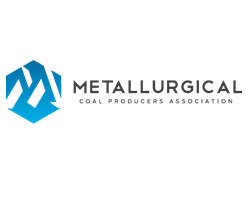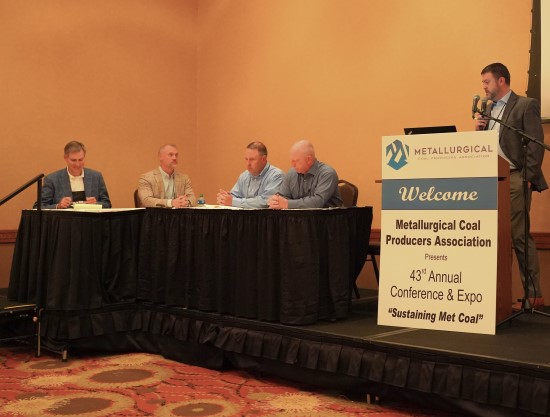Sustaining Metallurgical Coal Focus of 43rd MCPA Conference and Exposition

May 23, 2023 - The sustained importance of metallurgical (met) coal in today’s global economy was among the topics of discussion during the Metallurgical Coal Producers Association (MCPA) 43rd Annual Conference & Expo in Roanoke, WV, Monday, May 22.
A coal executive’s panel discussion, mine safety, the market for steel, the power grid and railroad transportation and capacity were highlighted by speakers during the morning session of the conference which continues through mid-day on Tuesday, May 23.
At a reception and dinner Sunday night, Bob Cline, of Coronado Global Resources, who serves as the current MCPA chairman, welcomed attendees to the conference noting that the MCPA has grown in membership to now include more than 100 associate members in addition to its coal producers.

Coal Executives Panel at MCPA
“Our association is growing and expanding and developing into a larger presence,” he said. “We need to communicate more that Met Coal Makes Steel and we need to continue to strengthen our outreach in educating legislators and the overall population.”
Cline said it is important to continue initiatives already started related to outreach in the schools and through increased presence on social media.
“It’s time to start talking about it,” Cline said. “With the teamwork we have, we are going to achieve our goals to educate our legislators and the public, to grow our organization with new members, to develop the workforce and to develop a strong stance with the present administration. There are so many requirements and regulations we face now. We can’t sit back and wait for them to make laws, we need to be ahead of them. We have got to step up our game and do even better.”
MCPA President Ben Beakes gave a brief presentation on metallurgical coal importance and noted while the organization has adopted “Met Coal Makes Steel” as its slogan, it is that simple message that drives home the point that steel is essential to everyday life. Cars, buildings, ships, bridges, houses, refrigerators and medical equipment all require steel and he added, steel is an indispensable material in almost every product used today.
Beakes noted that 74 percent of the 62.5 metric tons of coal sold in 2022 was exported. The top three ports from which it leaves the country are Norfolk, VA, 60 percent; Baltimore, MD, 17 percent; and Mobile, AL, 16 percent. The majority of the coal exported goes to Europe, followed by Asia, South America, Brazil, North America, Canada and China.
As the Monday session of the conference opened, Virginia Senator Travis Hackworth and Virginia Del. Will Morefield spoke briefly about the importance of met coal in rebuilding America and the duty they have as legislators from a coal producing area to educate their colleagues about the realities of and importance of coal. Newly appointed Virginia Department of Energy Director Glenn Davis also addressed attendees briefly via a Zoom call.
Conference attendees had the opportunity to hear from a coal executive panel comprised of Andy Eidson, Alpha Metallurgical Resources; Jeff Bitzer, Coronado Global Resources; J.P. Richardson, MetInvest-United Coal; and Scott Kreutzer, RAMACO Resources, each of whom gave a brief introduction of their companies.
All agreed metallurgical coal has a bright future given the myriad of uses it has in everyday life. They discussed growth management strategies, optimization, logistical constraints and the rearranging and prioritization to maximize growth within their companies. Also discussed were innovations and finding new ways to use met coal through various research initiatives underway. Capitalizing on productivity and safety and continued work in emissions reductions were additional areas of improvement.
The importance of continued education and outreach was stressed with Bitzer noting the country cannot achieve a net zero emissions status without met coal. He noted that steel is needed to make windmills and solar and that to accommodate those energy types, it will take 75,000 new miles of power line and the infrastructure to support those to be built.
“We are not going to get there without met coal,” Bitzer said. He also talked about the land mass needed to scale windmills and solar to contribute significantly to energy production. Combined, he said, those would cover the land mass of eight states.
Eidson noted that getting past 20 years of being vilified as an industry was no easy task, but he said as more and more realize what met coal makes possible, there is beginning to be momentum built to get that message out.
“We are going in the direction we need to go and we need to keep the pressure up,” he said.
Turning to discussion surrounding the push to go electric with vehicles or to increase wind and solar production, it was noted all require electricity which will further increase overall electrical demands.
“All the ‘solutions’ require electricity to work,” Bitzer noted.
Infrastructure rebuilding, Richardson added, requires steel.
Eidson also pointed out the value severance taxes paid by coal producers have in local, state and national economies.
Kevin Dempsey, with the American Iron & Steel Institute addressed conference attendees, noting met coal was key to the making of steel, but said at present only 4 percent of the global steel produced is actually made in the United States. He noted the outlook for steel is good with projected demand growth this year of 1.3 percent and next year, 2.5 percent. As electric cars become more in the mainstream, he said steel to protect the battery pack becomes an important downstream product. Non-building construction is also expected to account for some of the demand to include uses for energy production, highway infrastructure, sewage and water, water supply and conservation and development.
He spoke briefly about the importance of carbon capture and utilization in the future and suggested the expansion of a carbon capture tax credits could be a game changer which in the end would strengthen both the coal and the steel industry. He note there has been much new investment in the steel industry since tariffs were put into place. Additional incentives, he said all position steel for growth.
A safety panel featuring comments from Randy Moore with the Virginia Department of Energy and Frank Foster, West Virginia Office of Miners’ Health, Safety and Training about their state’s initiatives; along with company perspectives from Brian Keaton, Alpha Metallurgical Resources; Aaron Price, Coronado Global Resources; and Don Jones, MetInvest-United Coal focused on improving incident rates and integrated safety and productivity initiatives. Technological advancements and utilizing those were also components of the discussion. The importance of continued training, especially as the coal industry has changed in a post -COVID world to have more new miners involved was also discussed. Panelists agreed that was one of the biggest challenges facing the industry in the next five years as older miners retire and new ones come in to take their place.
Bill Murray, of Dominion Energy, addressed conference attendees noting that without electricity producers doing their jobs, no one else can do theirs. The importance of met coal to produce the steel for building the infrastructure needed to be in place for energy production, he said is critical and he added that thermal coal also remains important to serve customers as rough winter weather like that experienced at Christmas this past year illustrate again that without coal, there would not have been enough electricity to meet needs. He added that when people lose electricitythey are not concerned about what is being used to provide it again, just that it is working again.
“Thanks for everything you do to keep the grid operational,” Murray said.
The final discussion of the day was on rail transportation. Brad Yeatts, Norfolk Southern; and Joe Forkum, CSX Corp., talked about their respective companies and their focus on enhancing safety, recruiting and retaining workforce and reliability and resiliency in meeting the needs of their customers in hauling product from point A to the ports.
“We’re bullish on met coal,” Yeatts said. “The world needs it and we’ll be here for you.”
Forkum agreed, noting CSX has the capacity the met coal industry needs. He noted the company works on building positive relationships with its employees’ and its customers as well as all CSX stakeholders to achieve what he referenced as a collective success for the coal and the rail industry.
The conference will resume tomorrow, Wednesday, May 23 with discussions on market overviews for coal and steel, marketing, a government affairs panel and a general counsel roundtable.

